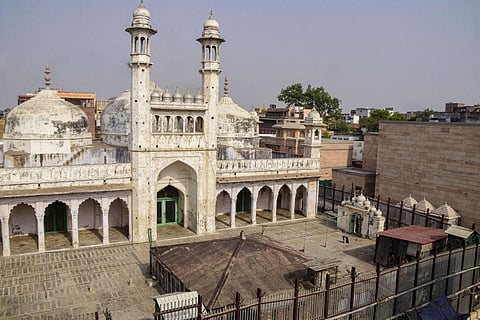

LUCKNOW: Admitting the plea against the Varanasi district court order rejecting the demand of carbon dating and scientific investigation of the purported ‘shivling’, claimed to have been found during a court-mandated survey of Gyanvapi complex on May 16, the Allahabad High Court sought the response of Archaeological Survey of India (ASI) over it besides issuing notices Anjuman Intezamia Masajid – the management committee of Gyanvapi mosque, the district authorities and others in the matter on Friday.
In the petition, filed by one of the Hindu plaintiffs Laxmi Devi, part of the litigation over the worship rights of Shrinagar Gauri on mosque premises, also demanded a ground-penetrating radar (GPR) survey of the area concerned.
Justice JJ Munir issued a notice in the matter and listed it for further hearing on November 21.
The dispute began when Hindu devotees approached a Varanasi court seeking the right to worship on Gyanvapi Mosque premises, claiming that it was a Hindu temple and still houses Hindu deities.
The plea moved by the petitioner in the lower court had sought the appointment of experts from the Archaeological Survey of India (ASI) to find out the age and nature of the purported ‘shivling’.
The Varanasi district judge on October 14, 2022, had dismissed the application saying that any scientific survey would be a violation of the order of the Supreme Court which had directed to secure the area where the purported 'shivling' had been found. The Varanasi district court judge Dr AK Vishvesha had rejected the petition seeking a scientific investigation of purported Shivlinga saying the exercise could damage the structure.
The order of the Varanasi district court was challenged before the High Court on the ground that it was wrongly presumed that a scientific investigation in the form of carbon dating or use of a ground penetrating radar would harm or damage the object.
According to the petitioner, it was presumed by the Varanasi court, without any material on record, that any harm or damage might be caused to the ‘shivling’, which is an article of faith for several crores of devotees of Lord Shiva.
According to the petitioner, the court was of the opinion that if ground penetrating radar (GPR) was allowed or any type of scientific investigation or carbon dating was conducted, it may cause harm to the structure concerned.
The petitioner added that there was no prayer in the application for scientific investigation that would be harmful, and further stated that ASI had sufficient means to investigate the object without damaging it.
Underlining that one of the opposite parties described the object as a fountain, the plea alleged that the lower court wrongly held that questions involved in the suit do not require ASI investigation and stated that a scientific investigation was necessary to ensure proper adjudication of the controversy.
The petitioners were represented by Advocates Hari Shankar Jain, Vishnu Shankar Jain and Prabhash Pandey.